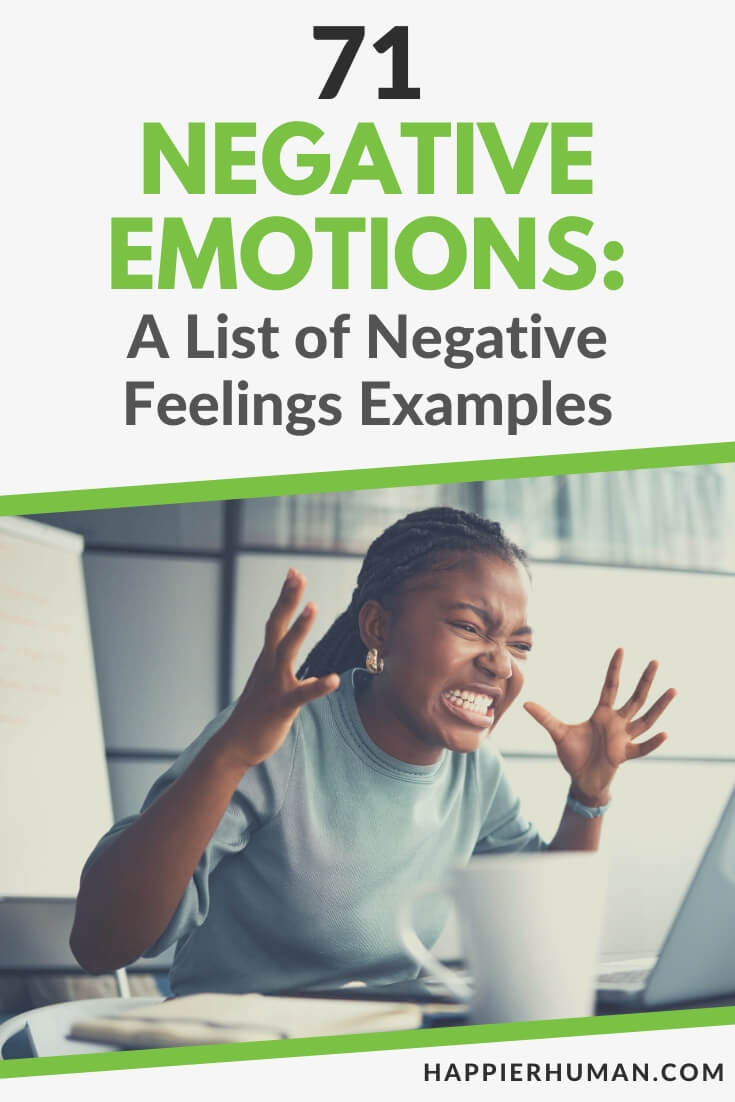We don’t set out to be negative people or walk around with negative emotions; however, those feelings and emotions invoke actions and reactions out of us that we have trouble controlling. Some of us cry while others scream, hit something, become withdrawn, or speak negatively to others.
Those negative feelings and reactions affect our determination to accomplish daily tasks, limit our productivity and, if we aren't careful, can become the lenses through which we look at specific circumstances. Additionally, they affect the way we approach every situation.
For example, you may be a positive and upbeat person. Yet, when someone mentions their husband, you are ready to change the subject because it triggers you and brings up painful memories. You may feel this way because you went through an unhappy marriage, and the circumstances surrounding your marriage bring up memories of negative experiences.
It is helpful to recognize when this type of thing happens so that you can learn to control how you respond. No one wants to allow the negatives that happened in their lives to shape how they choose to live.
What are Negative Emotions?
Negative emotions are feelings that cause you to be sad and miserable. Additionally, they cause many of you to dislike others or yourselves. There is a long list of negative emotions that reduce self-esteem, self-confidence, and overall happiness with life. Worse, depending on how long they affect us, those emotions can lessen our enthusiasm for life.
Negative emotions hinder us from behaving and thinking rationally and having the proper perspective when a situation occurs. This leads us to only view things how we want to see and remember them… lengthening the process of grief and anger we may be experiencing. And the longer we hold on to negative emotions, the worse the problem becomes.
When we don't correctly handle our negative feelings, they can harm us and others, causing us to spiral out of control and express ourselves through violent acts. That said, negative emotions are entirely natural to feel.
We all experience things that bring on negative emotions. However, there are strategies to help us cope with persistent feelings of negativity. Some strategies include:
Possible Causes of Negative Emotions
Negative emotions come from a variety of things.
When we repeat negative words that have been spoken to us by others.
For instance, I was always made fun of for being overweight when I was a kid. I was treated abrasively and then put down as if I was repulsive, especially if someone looked at me or talked about me in the context of having a relationship.
As a result, I grew up never thinking I would have anyone love me for me until I finally got comfortable in my own skin and quit believing the negativity. Afterward, I was constantly approached by people interested in dating, and I had to “fight them off” with a stick.
Blaming factors for things you cannot control.
Accept that negative things will happen that are out of your control from time to time, but how we respond to them either holds us back or propels us forward.
Hanging out with negative people.
“You are the average of the five people you spend the most time with.” Jim Rohn
The people we hang around have a profound impact on our lives. But unfortunately, when they are overly negative, we often learn the behavior and conform to it out of respect or the pressure to conform.
For example, Ronnie loved spending time with his grandfather. He taught him many things and was always loving and kind to him. So, Ronnie listened to him concerning all matters of life because he respected him so much.
But, sadly, Ronnie strongly dislikes other races of people because of his grandpa. So, when he saw them, he was filled with the negative emotions taught to him by his grandfather.
Comparing yourself to others.
“Comparison is the thief of joy.” – Theodore Roosevelt.
As great as it is, social media has been the source of the comparison game for many of us. We see people on extravagant vacations, driving high-priced cars, living in beautiful houses, and having what appears to be joy-filled marriages.
However, when we look at their lives and compare what we see to the reality of our lives, it often doesn't compare. This invokes negative emotions of envy and feeling sorry for ourselves.
The Difference Between Negative Emotions and Negative Feelings
When we think of negative feelings and emotions, we think of rejection, fear, jealousy, loneliness, anger, sadness, self-criticism, and other forms of mental anguish and pain.
Understandably, feelings and emotions are often commingled as the same thing. However, positive or negative feelings don’t exist without the corresponding emotions, but those emotions can stand alone.
Negative emotions are reactions to negative stimuli. It happens when brain activity affects the way we behave. It also invokes emotional and somatic responses (an involuntary response to stimuli like pulling your hand back after touching a hot iron).
Feelings are learned responses to the things that trigger our emotions. Negative feelings manifest in our thoughts because we are still bothered by the emotion of a dire circumstance from the past. It could have happened to us or others.
For example, some people are fearful and anxious about visiting the dentist. This feeling comes from an underlying negative emotion to something that happened to them in the past while in a dentist's office or a response because of what someone else experienced at the dentist.
Emotions and feelings should never be suppressed. Instead, we must take the steps needed to cope with our emotions and feelings in a healthy way.
71 Negative Emotions: A List of Negative Feelings Examples
1. Afraid
To be full of apprehension, reluctance, and distaste for something.
2. Aggression
Taking offensive action against someone by force.
3. Alarm
The sudden feeling of fear or distress caused by something potentially dangerous.
4. Anger
A strong feeling of wrath and displeasure.
5. Annoyed
To be bothered, irritated, or disturbed about something.
6. Anxious
Full of uneasiness and mental distress.

7. Apprehension
To anticipate misfortune, a fear of evil coming in the future.
8. Baffled
To be perplexed or puzzled about something.
9. Bewildered
To be completely confused or befuddled.
10. Bitter
A feeling of grief or that something is hard to bear.
11. Bored
Lack of interest in one's current set of circumstances or activities.
12. Claustrophobic
A solid irrational fear of tight spaces.
13. Confused
Lacking the ability to think clearly.
14. Contempt
To consider something as being worthless or vile. Additionally, it also means to disgrace, dishonor, or despise.
15. Cruel
Causing pain or suffering to others on purpose.
16. Dazed
Unable to appropriately react to a situation.
17. Depressed
State of being unhappy, downcast, and gloomy.
18. Despair
Feeling as if there is no hope.
19. Disappointment
Sadness caused by a lack of fulfillment.
20. Discombobulated
To be disconcerted and confused about a matter.
21. Discomfort
To be in a period of hardship or mild pain or a lack of comfort and ease.
22. Disgruntled
To be angry, frustrated, or dissatisfied with one’s situation.
23. Disheartened
To lose confidence or have a lack of determination because of an issue.
24. Dislike
To regard with distaste, displeasure, or hostility toward someone or something.
25. Dismay
Response to a sudden action that caused distress and great discouragement.
26. Dispirited
Having a lack of enthusiasm and feeling sad and disheartened. Also, feeling a loss of hope.
27. Displeasure
Being annoyed and disapproving of something or someone.
28. Disturbed
When the typical pattern or function of something is disrupted. Also describes a symptom of mental illness.
29. Doubtful
Feeling unsure or uncertain about the chance of something happening.
30. Dread
Not looking forward to something or having great apprehension about a thing.
31. Embarrassment
Feeling shame, awkwardness, or self-consciousness in a negative way.
32. Envy
The feeling of covetousness and discontent due to the success of another.
33. Exasperated
Extreme irritation or frustration about someone or something.
34. Fear
An emotion brought on by evil, pain, possible danger, or threat, whether real or imagined.
35. Fright
A sudden intense feeling of fear or a result of a scary experience.
36. Frustrated
An annoyance or frustration because of one's inability to change a situation.
37. Gloomy
A situation that appears to be scary or depressing.
38. Glumness
A feeling of being dejected or defeated.

39. Greediness
An extreme desire for possessions or wealth.
40. Grief
Trouble or sorrow caused by one’s death.
41. Grumpiness
The state of being slightly annoyed and likely to express displeasure.
42. Guilt
It is a feeling of remorse for one's wrongdoing, whether it actually happened or was imagined.
43. Hate
To have an intense aversion to something or someone.
44. Helpless
The inability to help yourself or anybody else.
45. Homesick
Sadness that comes on from being away from home for some time.
46. Horrified
A feeling of great horror and shock.
47. Humiliation
The state of being humiliated.
48. Hurt
An uncomfortable feeling due to pain, physically or emotionally.
49. Impatient
Completely annoyed because you have to wait or due to someone’s mistake.
50. Indignant
A feeling of strong displeasure because of something you find offensive.
51. Insecurity
Lacking confidence in one’s ability, or if someone thinks well of you or not.
52. Lazy
Not inclined to work or the state of consistent idleness.
53. Lonely
Discontent because you are not around other people.
54. Loopy
To be silly, strange, or unusual.
55. Mad
Extremely annoyed or angry.
56. Miserable
A feeling of being uneasy or something that is deplorable.
57. Moody
To experience sudden mood changes from feeling ok to being upset or angry very easily.
58. Nasty
Having a filthy attitude or being described as having an unkind or spiteful personality.
59. Negative
Expressing rejection or disapproval of something or someone.
60. Nervous
To be anxious or worried about something.
61. Numb
The inability of someone to act or feel emotion.
62. Offensive
Something highly annoying and something that causes anger.
63. Paranoid
Being worried or nervous about how you are viewed in the eyes of others and whether they mean you harm or not.
64. Pity
Sympathy or sorrow brought on by the misfortune of another person.
65. Rattled
To be worried or nervous about something suddenly.

66. Stubborn
To be tough, ruff, stiff, and unmoving in one's resolve.
67. Tension
When two groups have anger or resentment toward one another. It also means being nervous before an important event.
68. Upset
When someone is worried, angry, or unhappy about something.
69. Vulnerable
When someone can be easily offended or hurt physically or emotionally.
70. Weak
To lack strength or be considered fragile and frail. It also means to able to be crushed under pressure mentally or emotionally.
71. Wrath
To experience extreme anger or the consequence of one’s fierce indignation toward another.
Final Thoughts on 71 Negative Emotions: A List of Negative Feelings Examples
We must learn how to deal with our negative emotions and feelings since they are something we simply cannot avoid. We must be determined not to allow bad things to have the power over us.
First, we must let things go and stop obsessing over them. Secondly, it is helpful to stop and take a deep breath before reacting to any situation.
Then, it is crucial to focus on forgiving ourselves and releasing the shame that comes from things we have brought on ourselves. Lastly, we need to practice compassion and kindness toward ourselves and not buy into the negative voices that tell us we don’t deserve it.
When you the take power into your own hands, you can turn what was once negative and uncertain about life into a life of happiness… one worth living and enjoying. You do deserve it.


